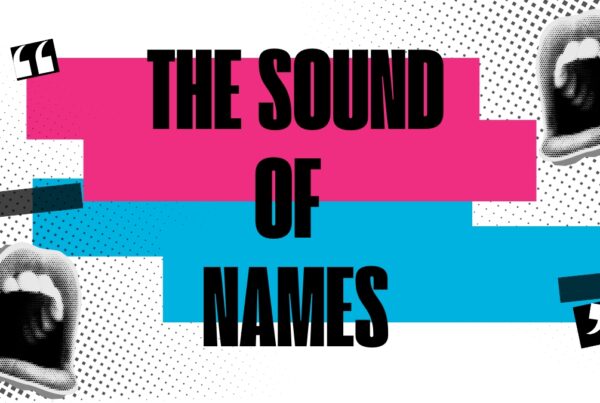Do Names Shape Who We Become?
Have you ever thought about if your name has an effect on your future? Some people believe that names are just labels, others believe they can form personality, career decisions, and even success. Researchers from various fields, including psychology and history, have investigated the influence of names on individuals’ lives, and their findings may surprise you! From career prospects to confidence, your name might have a bigger impact on your future than you think.
This article will explore the mysterious ways of how names might affect our destiny. Are individuals with specific names more likely to achieve success? Can a person’s name enhance their appeal? Are certain names associated with bad luck? Let’s explore the realm of names and their hidden influences.
How Names Affect First Impressions
Names can shape others’ judgement of us before they meet us, making first impressions important. Research indicates that individuals frequently form quick opinions based specifically on a name.
Common vs. Unique Names
Common names, such as John or Mary, are frequently used and easily recognisable. They provide a sense of familiarity, but in large groups they can cause confusion. Names that are unique usually stands out and create a lasting impression, but they may be more difficult to pronounce or spell.
- People with common names like “Michael” or “Sarah” are often seen as trustworthy and reliable.
- Unique names, like “Zephyr” or “Jazmyn,” can make a person stand out, but they may also be judged as unusual or hard to pronounce.
- In job applications, hiring managers sometimes favor familiar names because they seem more relatable.
Gender and Name Perception
Names frequently shape understanding of a gender, affecting how individuals are viewed in both social and professional situations. Gender is clearly indicated by traditional names such as William or Elizabeth, while confusion can appear with unisex names such as Jordan or Taylor.
- Some names sound strong and powerful, like “Alexander” or “Victoria,” which can give people an advantage in leadership roles.
- Softer-sounding names, like “Lily” or “Ethan,” are often associated with kindness and friendliness.
- In some cases, people with gender-neutral names (like “Taylor” or “Jordan”) are perceived as more adaptable and open-minded.
The Science Behind Names and Success
A number of studies suggest that names can have an effect on a person’s life success. But how does this happen?
Research suggests that names may influence career choices and success through nominative determinism and implicit egotism.
- Nominative determinism is the idea that people are drawn to professions that match their names (e.g., Bakers becoming bakers).
- Implicit egotism and the name-letter effect suggest that people subconsciously prefer things related to their names, influencing career decisions (e.g., more dentists named Dennis).
The Name-Letter Effect
The name-letter effect refers to a psychological event in which people show a preference for things that include the same letters as their names. As an example:
- A person named “Daniel” might be more likely to move to a city like Denver.
- Someone named “Carla” may be drawn to careers like “chef” or “counselor.”
- This unconscious bias can subtly guide people toward certain choices in life.
Easy-to-Pronounce Names and Success
A study found that people with easy-to-pronounce names often have better chances of success. This is because:
- Simple names are easier to remember.
- People associate easy-to-pronounce names with positivity and honesty.
- In business and politics, names that are easy to say tend to be more well-liked by the public.
Last Names and Financial Success
Research has also found a strange connection between last names and success. A study showed that:
- People with last names that start with letters near the beginning of the alphabet (like “Anderson” or “Brown”) may have an advantage in school and work settings because their names appear first on lists.
- In some cases, this small advantage leads to better opportunity
Can a Name Predict Personality?
Many people believe that a name can shape a person’s personality. But is this true? Some psychologists think that names influence how people see themselves and how others treat them.
Psychological studies suggest that names can subtly influence behavior, preferences, and success:
- Name-Letter Effect & Implicit Egotism: People unconsciously favor things related to their names.
- Example: A study found that students exposed to the letter “A” before a test performed better, while those exposed to “F” did worse.
- Example: Consumers are more likely to buy brands that share their initials (e.g., Peter preferring Pepsi).
- Nominative Determinism: People may be drawn to professions or locations that resemble their names.
- Example: A study using natural language processing found a higher-than-expected number of people living in cities or working in jobs that match their initials (e.g., Dennis becoming a dentist).
- Group Dynamics: Shared initials among team members can improve group performance.
- Example: Research showed that teams where members shared initials had better collaboration, higher confidence, and resolved conflicts more effectively.
The Self-Fulfilling Prophecy
The idea of a self-fulfilling prophecy suggests that a person’s expectations or cultural understanding can shape behaviors and results, therefore making the original expectation come true. In the context of personal names, psychological research has examined the ways in which names may affect traits of identity, behavior, and even physical appearance.
- If a child is given a name that sounds strong and powerful, they may grow up believing they are strong and powerful.
- A person with a fun and creative name might feel more encouraged to express themselves artistically.
- This idea is called the “self-fulfilling prophecy,” where people become what they believe they should be based on their name.
Imagine two students, Elizabeth and Destiny. Research shows that teachers may subconsciously associate Elizabeth with intelligence and academic success, while Destiny might be linked to lower expectations due to social stereotypes.
- Elizabeth’s Experience: Her teachers expect her to excel, so they give her more encouragement and challenging work. Over time, she becomes more confident and performs better, fulfilling the original expectation.
- Destiny’s Experience: Her teachers assume she won’t be a top performer and provide less academic support. She absorbs this perception, loses motivation, and her grades suffer—confirming the initial bias.
Influence on Facial Appearance
A study published in the Proceedings of the National Academy of Sciences investigated whether people develop facial features that align with social stereotypes associated with their given names—a phenomenon termed the “face-name effect.” Researchers found that participants could match names to faces at a rate higher than chance, suggesting that people might unconsciously adjust their appearance over time to conform to the social expectations linked to their names. This effect was less pronounced in children, indicating that the alignment between facial features and names strengthens with age.
Cultural Expectations and Names
- Different cultures associate names with certain traits. For example, in some countries, the name “Sophia” is linked to wisdom.
- Parents may raise their children differently based on the expectations tied to their names.
- Studies show that people with names that sound elegant or noble may act more refined due to how they are treated.
Do Names Affect Career Choices?
Some studies suggest that names can even influence the type of job a person gets. But why does this happen?
Research has explored how personal names may influence career choices, a concept linked to nominative determinism and implicit egotism. Notable studies include:
- Ernest L. Abel (2010) examined medical professionals and found that doctors and lawyers were more likely to have surnames resembling their professions (e.g., Dr. Doctor or Mr. Lawyer), suggesting that names might subconsciously guide career paths.
- Frederik Anseel & Wouter Duyck (2007) found that employees were more likely to work for companies with initials matching their own, reinforcing the name-letter effect in career decisions.
- Alexandre Pascual et al. (2015) analyzed job applications and found that individuals with more common first names had a higher likelihood of securing interviews, suggesting that name familiarity plays a role in hiring.
The Power of Name Associations
- If a name is linked to a successful or famous person, people may assume the person with that name is also successful.
- Names like “Elon” or “Oprah” may be linked to business and leadership because of famous figures.
- A study found that people with last names related to jobs (like “Baker” or “Fisher”) sometimes end up in similar careers.
Names have a lot of power! They can shape how people see you and even affect your future.
First Impressions: People hear a name and instantly make guesses. A name like Max might sound strong, while Lily might seem kind and gentle.
Jobs & Success: Fancy-sounding names like William or Catherine might make someone seem more important, which could help them get better jobs.
Name Bias: Some names get treated unfairly. If a name is hard to pronounce or sounds different, people might judge without meaning to.
Growing Into a Name: If people always say you’re smart because of your name, you might start believing it and act that way.
Brand Names Matter Too: Companies pick names that make you feel something. Dove sounds soft and clean, while Tesla feels cool and high-tech.
Bias in Hiring
- Research shows that some employers may unconsciously prefer certain names over others.
- In one study, identical resumes were sent to companies, but one had a common name and the other had an uncommon or foreign-sounding name. The common name received more interview offers.
- This shows that names can sometimes create barriers in job searches, even when skills and experience are the same.
Bias in Hiring means that some people get treated differently in job interviews just because of their names.
First Impressions Matter: Employers see a name on a résumé and might guess things like where someone is from or how smart they are.
Common vs. Unique Names: People with common names like Emily or Michael might get more job interviews than those with unusual names.
Cultural Bias: Some names sound like they come from certain countries, and unfair bosses might judge before meeting the person.
Gender Bias: Some names sound more “male” or “female.” A name like Jordan (which can be for boys or girls) might get different reactions depending on the job.
The “Perfect Name” Myth: Some studies show that people with “professional-sounding” names, like Alexander or Victoria, might get hired faster.
Can Changing Your Name Change Your Life?
If names have such an impact, can changing a name change a person’s future? Some people believe it can!
Celebrities Who Changed Their Names
Many famous people changed their names to help their careers:
- Elton John was born Reginald Dwight.
- Marilyn Monroe was born Norma Jeane Mortenson.
- Bruno Mars was born Peter Gene Hernandez.
By choosing new names, these stars created strong identities that helped them succeed.
People Who Changed Their Names for Personal Reasons
- Some people change their names because they feel their original name does not match their personality.
- Others do it for cultural or religious reasons.
- Many people say they feel more confident and successful after changing their names.
The Future of Name Trends
Names change over time, and new trends keep appearing. As we look toward the future, several emerging trends are shaping the choices parents make when naming their children. But what does the future hold?
Revival of Vintage and Retro Names
Classic names from past eras are experiencing a resurgence. Names like Eloise, Vivian, and Arthur are becoming popular again, offering a blend of nostalgia and timeless appeal. This trend reflects a desire for names that have stood the test of time.
Nature-Inspired and Cottagecore Aesthetics
The cottagecore movement, emphasizing simplicity and a connection to nature, has influenced baby naming practices. Parents are gravitating toward names that evoke natural beauty and pastoral charm, such as Hazel, Ivy, and River. This trend underscores a yearning for tranquility and a harmonious relationship with the environment
Gender-Neutral and Unisex Names
There is a growing preference for names that transcend traditional gender boundaries. Names like Rowan, Kai, and Avery are being chosen for their versatility and modern appeal. This shift reflects a broader societal move toward inclusivity and fluidity in gender identity.
Professional Baby Naming Services
The complexity and significance of choosing the right name have led some parents to seek professional assistance. Baby name consultants offer personalized services to help navigate the myriad of options, ensuring the chosen name aligns with familial and cultural preferences.
Popular Names and Trends
- Short, simple names like “Liam” and “Ava” are becoming more common.
- Unique and creative names are on the rise, as parents want their children to stand out.
- Some people are naming their kids after technology or modern trends, like “Tesla” or “Zen.”
Could Names Become Less Important?
- As the world becomes more digital, usernames and online identities might replace real names.
- Some experts believe that in the future, people might have more freedom to change their names whenever they want.
Conclusion: Does Your Name Control Your Destiny?
So, can your name predict your future? While a name might not completely decide your fate, it can certainly influence how people see you, how you see yourself, and even the opportunities you get. Names shape first impressions, personality, and even career paths in subtle but powerful ways.
Yet, despite the influence of our given names, many people choose to go by something else—a nickname. Whether it’s for familiarity, self-expression, or even reinvention, nicknames carry their own significance. But why do we use them, and what do they reveal about us?Find out in our next article: Why Do We Use Nicknames?




